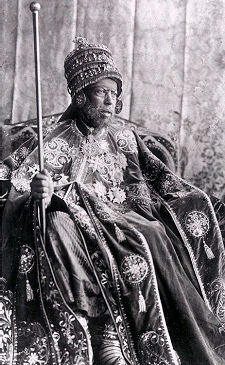Tadias Magazine
By Tadias Staff
Published: Thursday, January 16th, 2014
New York (TADIAS) – When Robert P. Skinner, the first American Ambassador to Ethiopia, arrived in Addis Ababa on December 18th, 1903, the Ethiopian capital was a brand new city with a permanent population of no more than 50,000. The Djibouti-Ethiopia railway was still under construction and partially finished up to Dire Dawa. The post office had just opened, and the telephone was the latest technology creating a buzz in town.
“After Adwa Menelik’s political independence was a recognized fact,” Skinner noted in his memoir initially published by Longmans, Green and Company in 1906. “The new railroad, the highways, the bridges, the telephones – all these things he probably cares very little for in themselves, but he realizes that nations must advance or they must fall.” Ambassador Skinner pointed out “if independent Abbyssinia falls, that contingency is most likely to result from dissensions from the Abyssinians themselves.”
Addis Ababa was already taking shape as the diplomatic capital of Africa with the presence of several embassies representing all the major powers of the day — including the British, French, Russians and the Italians. Ambassador Skinner had arrived in Ethiopia carrying draft copies of the very first U.S.-Ethiopia commercial treaty (both English and Amharic versions), that Menelik would later approve setting in motion more than a century of U.S.-Ethiopia relations. “What our diplomatic friends may have thought of the American mission considered politically may have been favorable or unfavorable, in any event they certainly contributed memorably to the personal pleasure of our visit by boundless hospitality, which ceased only when we went away, and after having assembled as guests under the flag of every nation represented officially in Ethiopia,” penned Skinner, who was accompanied by twenty four marines, a medical team and other assistants. “It filled us with new respect for diplomacy as a profession and fine art.”
The American Ambassador had quickly struck up a friendship with Menelik through a series of private meetings to iron out the details of the inaugural agreement between the two nations. According to Skinner, all prior business between the United States and Ethiopia had been conducted through a third party, often involving England, France or Italy.
“[Menelik’s] thirst for information is phenomenal,” added Skinner. “I once suggested to the Emperor that he send some of his young men to our American schools and colleges. ‘Yes, that will come,'” said he. “‘Our young men must be educated. We have much to do.'” At the moment, however, both were focused on securing a bilateral accord that would guarantee a market for each country’s products. Skinner emphasized that in those years the total amount of Ethiopia’s foreign trade (import and export) was valued at no more than $2,316,000, of which the American share amounted to $1,389,600. Of this, Skinner recorded, American cotton goods generated $579,000 while Ethiopian exports of skins and hides earned $675,000 and coffee fetched $135,100.
“The practical question of whether it has been worthwhile to establish friendly relations with Ethiopia has been answered,” Skinner declared. “We naturally look to the future to develop the now non-existent commerce of really important volume.”
During a celebratory dinner, Skinner described how Menelik would send spicy Ethiopian food for them to taste. “These dishes were invariably seasoned with some sort of concentrated fire which seem to race through the system and scarify the whole alimentary tract,” Ambassador Skinner noted. “The Emperor nodded cheerfully over our difficulties and recommended Tej to relieve the situation.”
In regards to the country’s growing bureaucracy, Skinner noticed that “much stress has been laid by all returning travelers upon the presumed fact that nothing can be accomplished in Ethiopia of an official character without a judicious distribution of presents,” adding that “it would be untrue to say small gifts of money are not extremely necessary at times in Addis Ababa.”
His only regret, Ambassador Skinner admitted, is that he did not get a chance to meet with the legendary Empress Taitu. “Nothing in a way of public ceremonial occurred during our stay in which her presence was involved, and we departed too soon to have the pleasure of seeing her in private,” he recalled. “She is said to be a woman of great force of character, and in her youth, one of striking beauty.” He added: “She is now forty-seven years of age. She has been several times married and became the wife of the present Emperor in 1883. They have no children. This fact raises the question of succession in the mind of everyone visiting the empire.”
Back in the States, the treaty was passed by congress in less than three months, without any filibuster. It was signed by President Theodore Roosevelt in the Spring of 1904. Robert Skinner, who was born in Ohio in 1866, spent most of his life as a career diplomat serving in France, Germany, Great Britain, Greece, Estonia, Latvia, Lithuania and Turkey. He eventually moved to Maine where he died at the age of ninety-four. Ambassador Skinner remains the chief architect of United States-Ethiopia relations.
Emperor Menelik II passed away on December 12, 1913, and a century later he still inspires books, movies, music, and political debates. But there could be no doubt of his epic role in preserving Ethiopia’s independence.
Below are photos of Emperor Menelik and Empress Taitu:
—
Related:
First Ethiopian Delegation to the U.S. in 1919 Made Headlines
African American and Ethiopian Relations
